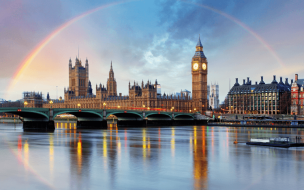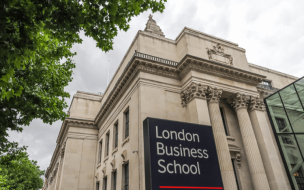LBS prides itself on the global focus of its graduate programs. MBA students can take advantage of London’s role as an international business capital—10 Fortune 500 companies are headquartered in the city—and participate in exchanges with other global business schools during their course.
The MBA at LBS is evidently a worthwhile investment, as the MBA employment report for the graduating Class of 2023 shows. The mean graduate salary in 2023 was $120,238, and the finance and consulting industries saw even higher average starting salaries.
Naturally, the consulting and finance industries are well-represented in the MBA Class of 2026. However, other students come from various industries, including energy, non-profit, retail, and engineering.
This diversity in industries is also reflected in a list of notable alumni from LBS. Previous graduates include Savio Kwan, former COO of Alibaba, and Tim Kopra, a retired NASA astronaut.
But what does the LBS MBA Class of 2026 look like? Here’s our breakdown.
Overview of the LBS Class of 2026
There are 431 students in the Class of 2026, in line with class numbers at other comparable business schools. This is a small drop compared to the year before, when 487 students enrolled.
The Class of 2026 brings an average of five years of work experience, with an average age of 29.
Impressive diversity is also apparent in the nationalities of students in the Class of 2026. A total of 65 nationalities are represented in the MBA, and 90% of the class are international students.
Where LBS MBA students come from
The LBS MBA attracts students from every continent, and students in the Class of 2026 come from 65 different nationalities, more than the previous year’s cohort. UK students make up only a small proportion of the class (10%), and no one region represents more than 20% of students on the MBA.
The highest proportion of students come from North America (18%), though students from Central/South America (17%) are also well represented.
A further 12% of students on the program hail from South Asia, 14% from Europe, 8% from the Middle East, and 4% each from Oceania and Africa. Compared to the Class of 2025, LBS has increased its intake of students from the Middle East and Europe this year, while domestic student intake has declined marginally.
LBS is committed to improving gender parity in the business classroom. In the Class of 2026, 45% of students are women, which LBS have increased from just 38% two years ago.
The Women in Business Club at LBS ensures that women feel empowered during their degrees, and the Club hosts workshops and networking events to improve personal development for women on LBS programs.
Diversity in the LBS Intake
GMAT score acceptance rate
Based on the most recently available data, the average GMAT score in the MBA class is 708 (under the scoring system of the previous GMAT), which puts LBS MBAs in the 91st percentile globally for GMAT scores. This is equivalent to a score of approximately 645-665 in the updated version of the GMAT exam.
This score places LBS at the lower end of the list of average GMAT scores at the top 20 MBA programs, and therefore could present a great opportunity for aspiring students.
Historically, accepted GMAT scores at LBS have ranged between 600 and 800, so there’s no guarantee that a lower-than-average score means you won’t be admitted. This score range is between 555-805 in the updated version of the GMAT exam.
The average range for GRE scores on the LBS MBA program is equally high, with admissions directors suggesting students aim for 163 and 164 in the verbal and quantitative sections of the test.
Undergraduate majors
While exact data on undergraduate majors for the MBA Class of 2026 is unavailable, LBS does offer guidance to students on the average backgrounds of MBA students.
Undergraduate majors in subjects like business, engineering, or IT are common on MBA programs, but LBS states that there is no particular preference for students with a background in business.
In fact, the school welcomes applications from students with a background in humanities, including the arts, languages, and philosophy.
However, typical undergraduate backgrounds also include pure sciences, engineering, maths, and social sciences.
MBA work experience
Almost one-third of students on the LBS MBA have a background in consulting, which isn’t a surprise considering it’s one of the most popular postgraduate industries for MBA graduates. Similarly, London’s status as a professional services hub likely draws students interested in gaining further experience in the industry.
Overall, students with backgrounds in consulting and finance comprise 55% of the Class of 2026. This ratio remains fairly consistent year-on-year—in the Class of 2025, 50% of students had consulting and finance backgrounds.
The third most popular industry background is IT and technology (7%). For the rest, students come from a wide variety of industries, including retail (5%), healthcare (5%), energy (2%), engineering (3%), non-profit (9%), and automotive/aerospace (2%).
Meanwhile, a little over 1 in 10 students come from an industry not categorized above, evidence of the broad range of experiences represented on the LBS MBA program.
The average amount of work experience for LBS MBA students is 5.5 years. However, in recent years, the MBA class has enrolled students with between 2 and 13 years of work experience.
LBS Pre-MBA Industry

Given that London Business School is a top 10 global business school, you’ll have to put everything into your application to secure a place.
This means aiming for a strong GMAT Exam score and proving you have the leadership potential to thrive on this global MBA program in London.
However, prospective students don’t have to worry about a non-traditional background harming their chances of being accepted.
While most students come from traditional backgrounds such as finance and accounting, LBS doesn’t necessarily express a preference for these types of students. The MBA intake comes from a wide variety of industry backgrounds, and not everyone has a business undergraduate degree.
One of the biggest highlights of the MBA program at LBS is the level of diversity among students. The program attracts significant numbers of women and students from diverse corners of the globe, including Africa, South America, and East Asia.
London’s status as an international city is undoubtedly an attraction for students, as is its world-renowned finance and professional services job markets.
Indeed, although many LBS MBA graduates accept roles in consulting and finance, opportunities exist elsewhere, including in technology, energy, and entrepreneurship.









